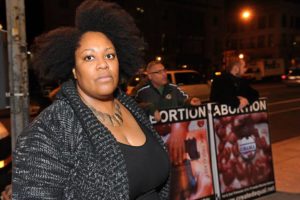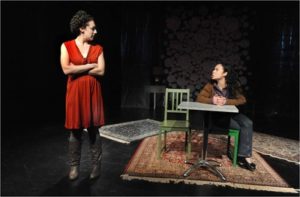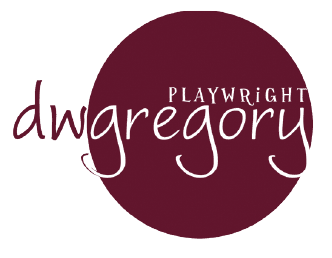“Murderer!”
A week ago I stood outside Studio Theatre on 14th Street in Washington, D.C., with my friend Jacqueline Lawton and endured that accusation—that we were killers of innocents.
Our crimes? Writing four-minute vignettes based on the true stories of women who had abortions. In my case, my scene was inspired by a young woman who braved a line of anti-abortion protesters—very like the line outside the theatre that night—and went ahead with her decision to end an unwanted pregnancy.
The protesters were vehement in their conviction—55 million innocents dead, blood on your hands, how dare you?
My answer: Why don’t you come inside and see the play? And then we can talk.

I was one of nine other D.C. playwrights whom Jackie had invited to participate in Out of Silence: Abortion Stories from the 1 in 3 Campaign. A project of Advocates for Youth, a nonprofit with a mission to help young people make informed and responsible decisions about their reproductive and sexual health, Out of Silence consists of 13 scenes intended to give voice to women whose stories are seldom heard—stories of women who had undergone abortions for all sorts of reasons, all deeply personal and individual, and who (mostly) had no regrets about it.
It’s not a story you hear very often, and it doesn’t fit with the usual narrative of a troubled woman struggling to decide to end a pregnancy, then spending years in recrimination and sorrow over the choice. Certainly some women do have deep regrets—but a lot of the stories collected by Advocates for Youth in their 1 in 3 Campaign reflect a different reality. The campaign is so named because 1 in 3 women will have an abortion in their lifetimes, and so far, they’ve gathered about 700 testimonials. And for many of these women, having an abortion was a liberation.
I will confess that when Jackie first contacted me about the project my initial thought was to say no. I’m neither an advocate for abortion rights nor an advocate against them. I’m ambivalent. Had I ever been so lucky as to conceive, I don’t think I would have let circumstances persuade me to end the pregnancy. I’m childless by default; not for lack of trying, but because nature and opportunity did not coincide to allow me the family life I had wanted for so long. And I feel very sad about that.
But I also know that for many women, an unexpected pregnancy is not good news. For some, it’s an agonizing discovery. Young, scared, unemployed, battered or abandoned, victims of rape or other violence, chronically ill or for other reasons poorly equipped to bear and raise a child, they sort through their options and decide that abortion is the only thing that makes sense. And I don’t believe it’s for me or anyone else to decide for them that they must go through with the pregnancy if they have decided they can’t.
So after thinking it over, I agreed to sign on and write a scene from the point of view of a character that I can’t relate to very well—someone who decides she is going to do this—and try to tell her story without judgment. For the protesters outside the theatre, this makes me complicit in murder—a line of reasoning, if you call it reasoning, that I also cannot connect to very well.
And not one of them accepted our offer to come in and see the play.

Which I thought said a great deal about what their true agenda is. Because it seems to me that if you are truly pro-life, as you claim to be, then you have every reason to see this play. Why not see it? Why not see the lives of individuals who are making a choice you find abhorrent? Why not hear their stories and try to understand why they feel driven to this choice? And if you want them to make a different choice, understanding their stories might enable you to offer them an alternative that works.
One major reason a lot of women choose abortions is economic; a number of the vignettes in the evening illustrate that harsh reality. Abortion is a choice, but for some impoverished women, it really isn’t a choice, it’s the only option they have because they are backed into a desperate corner.
Seems to me if you want to prevent abortions, you might want to understand that reality. You might then decide to work to ensure that birth control is available to anyone who wants it, regardless of income. You might see the value of public health initiatives and sex education efforts. You might advocate for social programs to support single mothers, or for public funding to underwrite child care or to sustain organizations that try to connect pregnant women with adoptive families—so that instead of screaming bloody murder at a stranger in crisis, you are working to offer her a solution.
A little compassion might go a long way.
But that’s not what this movement is really about. It was clear to me, standing outside the theatre last week, looking at those outraged faces screaming at me and Jackie, condemning us to hell and worse—without knowing a thing about us—I realized these particular protesters had no interest in understanding any point of view but their own. And they aren’t there to persuade. Their purpose is to harass and intimate. Their real agenda is punishment—to condemn women for their sexuality, to berate them for their audacity in refusing to accept the consequences of their “sins.”
One thing I know: Nothing they said that night persuaded me to back away from this project. If anything it made me more determined to expand my scene into a full-length play. It emboldened me to tell the rest of the untold story – and by doing that, find my way inside the experience of someone completely unlike myself, who makes choices I don’t think I would make, and to write her character with authenticity, compassion and–dare I say it?–respect.
